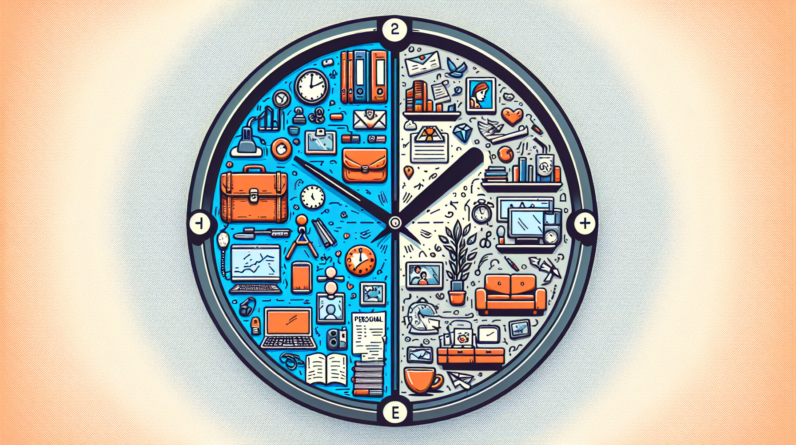
Is the constant pressure and demands of your job leaving you feeling exhausted and overwhelmed? It’s time to reclaim your work-life balance and find your path to bliss. In this article, explore practical strategies and insights that can help you transition from burnout to a state of harmony. Discover the importance of setting boundaries, nurturing self-care practices, and finding fulfillment outside of work. Say goodbye to the draining cycle of burnout and embrace a more balanced and fulfilling life.
Recognizing the Signs of Burnout
In our fast-paced and demanding world, it’s easy to overlook the signs of burnout. One of the first indicators is a feeling of physical and emotional exhaustion. You may notice that you’re constantly tired, even after a good night’s sleep, and that you lack the energy to engage in activities you once enjoyed.
Alongside exhaustion, chronic anxiety and stress are common symptoms of burnout. You may find yourself constantly worrying, feeling overwhelmed, and unable to relax or unwind. This constant state of heightened stress can have a detrimental impact on both your physical and mental well-being.
Another sign of burnout is losing interest and motivation in your work. Tasks that used to excite you now feel drab and monotonous. Your productivity may decline, and you may struggle to find meaning or purpose in your daily tasks.
Difficulty focusing and making decisions is another prominent sign of burnout. You may find yourself easily distracted, and it becomes challenging to concentrate on the task at hand. Indecisiveness creeps in, and even simple choices become overwhelming.
Lastly, burnout often leads to a neglect of self-care and personal life. You may find yourself sacrificing your own well-being in favor of work, neglecting hobbies, relationships, and leisure activities that bring you joy.
Understanding the Impact of Work-Life Imbalance
Work-life imbalance can have significant consequences on both your physical and mental health. When your work takes over your life and you neglect to create boundaries, you expose yourself to an increased risk of various health issues.
Constantly being in work mode puts a strain on your relationships. Friends and family may feel neglected or see you as always unavailable. This can lead to social isolation, which further exacerbates feelings of burnout.
Work-life imbalance often results in reduced productivity and performance. When you’re constantly overwhelmed and exhausted, it becomes challenging to focus and deliver high-quality work. This can have negative implications for your professional growth and overall job satisfaction.
Ultimately, work-life imbalance negatively impacts your overall well-being. It leaves little room for self-care and personal growth, both of which are crucial for a healthy and fulfilling life.

Assessing Your Current Work-Life Balance
Recognizing the need for change is the first step in reclaiming a healthy work-life balance. Start by identifying your priorities and values. What truly matters to you outside of work? This reflection will guide you in setting boundaries and making intentional choices.
Analyze how you currently allocate your time and energy. Are you spending an excessive amount of time at work? Are you neglecting activities that bring you joy and fulfillment? Identifying areas of imbalance will provide insight into what needs adjusting.
Consider the impact of your current work-life balance on your overall happiness. Are you satisfied with your current state? What changes do you envision to enhance your well-being? Honest self-assessment is essential in realizing when it’s time to make a change.
Setting Boundaries and Prioritizing Self-Care
Establishing clear boundaries between work and personal life is crucial for achieving a healthier balance. Learn to say ‘no’ when necessary and delegate tasks to others. By setting limits on your availability, you create space for self-care activities and meaningful personal experiences.
Designate specific time for self-care activities. Whether it’s reading a book, going for a walk, or practicing mindfulness, prioritize activities that nourish your mind, body, and soul. These moments of self-care are vital for replenishing your energy and preventing burnout.
Don’t forget to prioritize hobbies and interests outside of work. Engage in activities that bring you joy and provide a sense of fulfillment. By dedicating time to your passions, you bring more balance and happiness into your life.

Implementing Effective Time Management Strategies
Time management is a key component of reclaiming your work-life balance. Start by creating a structured schedule and making to-do lists. By organizing your tasks and allocating specific times for each, you gain a sense of control over your workload.
Utilize time-blocking techniques to maximize your productivity. Dedicate specific blocks of time for focused work, breaks, and personal activities. This method helps prevent multitasking and promotes focus and efficiency in your work.
Setting realistic goals and deadlines is essential for avoiding feelings of overwhelm. Break big projects into smaller, manageable tasks and set achievable deadlines for each. This allows you to make progress without feeling constantly overwhelmed.
Remember, avoid multitasking whenever possible. Prioritize tasks based on importance and urgency, and tackle them one at a time. By focusing on one task at a time, you’ll be more productive and feel less mentally strained.
Improving Communication and Seeking Support
Effective communication is crucial in reclaiming your work-life balance. Learn to express your needs and concerns to colleagues and superiors. By setting clear expectations and boundaries, you can create a healthier work environment that supports your well-being.
Seek support from friends, family, or professional networks. Share your challenges and seek advice from those who have experienced similar situations. Building a support system allows you to gain different perspectives and find encouragement during difficult times.
Consider therapy or coaching for additional guidance. A professional can help you explore the underlying causes of your work-life imbalance and provide strategies to overcome them. They can help you identify patterns, create new habits, and navigate through the challenges you face.
Finding Joy and Satisfaction in Your Work
Reflect on your current job satisfaction and evaluate what aspects bring you joy. Take note of tasks or projects that ignite a spark within you. By discovering your passions and interests within your work, you can find ways to incorporate more of these elements into your daily routine.
Consider how you can make your work more meaningful. Are there initiatives or projects you can take on that align with your values? By finding purpose in your work, you’ll feel more engaged and motivated.
Explore opportunities for growth and learning within your current role. Take advantage of professional development programs, courses, or workshops that can enhance your skills and knowledge. Challenging yourself and expanding your capabilities can contribute to a greater sense of satisfaction in your work.
Creating Work-Life Integration
Work-life integration is the concept of merging your work and personal life harmoniously. Rather than viewing them as separate entities, seek ways to find synergy between the two.
Identify ways to bring elements of your personal life into your work environment. Decorate your workspace with items that inspire you or remind you of loved ones. Incorporate personal rituals, such as taking a short walk or enjoying a cup of tea, into your workday.
Find flexibility in your work environment if possible. Explore options for remote work or flexible schedules that allow you to prioritize personal commitments. Embracing a flexible work arrangement can significantly contribute to achieving a better work-life balance.
Leverage technology to your advantage. Utilize tools and apps that help you streamline your work and increase productivity. By maximizing the efficiency of your work processes, you create more time for personal pursuits.
Building Healthy Habits and Routines
Creating healthy habits and routines is essential for maintaining a balanced and fulfilling life. Prioritize sleep and practice good sleep hygiene. Aim for a consistent sleep schedule and create a calming bedtime routine to enhance the quality of your rest.
Incorporate regular exercise and physical activity into your routine. Physical movement not only improves your physical health but also has a positive impact on your mental well-being. Find activities you enjoy and make them an integral part of your schedule.
Nurture healthy eating habits for sustained energy. Opt for nutritious meals and snacks that fuel your body and mind. Hydrate adequately throughout the day to maintain optimal physical and cognitive function.
Practice mindfulness and stress-reducing techniques. Incorporate moments of pause and relaxation into your day. Engage in deep breathing exercises, meditation, or journaling to alleviate stress and cultivate a sense of calm.
Reassessing and Adjusting Your Work-Life Balance
Reassessing your work-life balance should be an ongoing process. Regularly evaluate how you’re doing by reflecting on your priorities, values, and well-being. Take time to observe any potential triggers for imbalance and reflect on what adjustments may be necessary.
Flexibility and adaptability are key in adjusting as needed. Recognize that your work-life balance may require occasional modifications as circumstances evolve. Embrace the opportunity to shift your focus and adjust the balance whenever necessary.
Celebrate your progress and acknowledge your achievements along the way. Recognize the effort you’re putting into reclaiming your work-life balance and the positive impact it has on your life. Each step forward brings you closer to a healthier, more fulfilling work-life integration.
In conclusion, recognizing the signs of burnout, understanding the impact of work-life imbalance, and reassessing your priorities are key to reclaiming your work-life balance. Setting boundaries, prioritizing self-care, implementing effective time management strategies, improving communication, and seeking support are all crucial steps in achieving a more balanced and fulfilling life. By finding joy and satisfaction in your work, creating work-life integration, building healthy habits and routines, and regularly reassessing and adjusting, you can reclaim your work-life balance and experience the bliss it brings.







